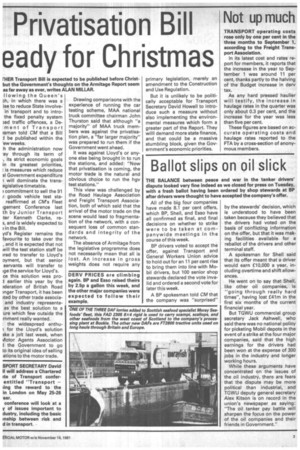Ballot slips on oil slick
Page 3

If you've noticed an error in this article please click here to report it so we can fix it.
THE BALANCE between peace and war in the tanker drivers' dispute looked very fine indeed as we closed for press on Tuesday, with a fresh ballot having been ordered by shop stewards at BP after drivers were thought to have accepted the company's offer.
All of the big four companies have made 8.1 per cent offers, which BP, Shell, and Esso have all confirmed as final, and final decisions on whether to strike were to be taken at companywide meetings in the course of this week.
BP drivers voted to accept the offer, against Transport and General Workers Union advice to hold out for an 11 per cent rise to bring them into line with Mobil drivers, but 100 senior shop stewards declared the vote invalid and ordered a second vote for later this week.
A BP spokesman told CM that the company was "surprised" by the stewards' decision, which is understood to have been taken because they believed that the drivers had voted on the basis of conflicting information on the offer, but that it was making facilities available for a reballot of the drivers and other terminal staff.
A spokesman for Shell said that its offer meant that a driver would earn £10,000 a year, including overtime and shift allowances.
He went on to say that Shell, like other oil companies, is "going through really hard times", having lost £41m in the first six months of the current financial year.
But TGWU commercial group secretary Jack Ashwell, who said there was no national policy for picketing Mobil depots in the event of a strike at the four major companies, said that the high earnings for the drivers had been won at the expense of 300 jobs in the industry and longer working hours.
While these arguments have concentrated on the issues of the oil industry, there are fears that the dispute may be more political than industrial, and TGWU deputy general secretary Alex Kitson is on record in the union's newspaper as saying: "The oil tanker pay battle will sharpen the focus on the power of the oil companies and their friends in Government."






















































































